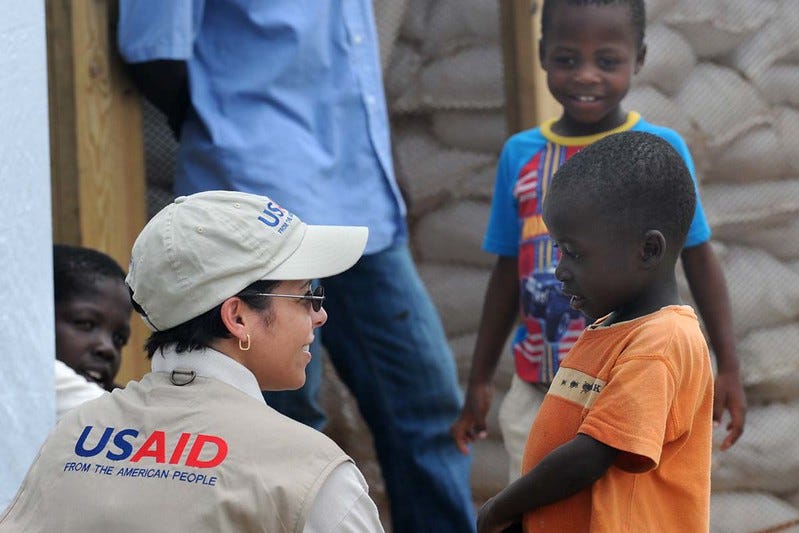JFK cited America’s ‘moral obligations’ in urging creation of USAID
'A program of assistance to the underdeveloped nations must continue because the nation's interest and the cause of political freedom require it,' President Kennedy said.

By Frederic J. Frommer
Last week, the U.S. Agency for International Development ceased to exist, 64 years after President John F. Kennedy cited “our moral obligations as a wise leader and good neighbor in the interdependent community of free nations” in calling for the agency’s creation.
Secretary of State Marc Rubio struck a very different tone in his July 1 Substack post, headlined, “Making Foreign Aid Great Again.”
“Beyond creating a globe-spanning NGO industrial complex at taxpayer expense, USAID has little to show since the end of the Cold War,” he claimed.
“This era of government-sanctioned inefficiency has officially come to an end,” Rubio added. “Under the Trump Administration, we will finally have a foreign funding mission in America that prioritizes our national interests. As of July 1st, USAID will officially cease to implement foreign assistance. Foreign assistance programs that align with administration policies—and which advance American interests—will be administered by the State Department, where they will be delivered with more accountability, strategy, and efficiency.”
Defunding USAID could lead to 14 million deaths over the next five years, according to a study by the medical journal Lancet, which estimated that the programs supported by USAID prevented 91 million deaths between 2001 and 2021 in low- and middle-income countries.
Ironically, frustration with U.S. foreign aid was a major factor in USAID’s formation in 1961.
Even before Kennedy took office, publication of the seminal bestselling 1958 novel The Ugly American, which depicted bungling and out-of-touch U.S. diplomats, led Congress to review foreign aid. The book’s epilogue argued that “we spend billions on the wrong aid projects while overlooking the almost costless and far more helpful ones.” This year, Americans heard echoes of that when the White House targeted specific USAID projects for ridicule.
Kennedy created the agency via executive action in 1961. A revealing history that was available on the USAID website until early this year—since taken down—explains the backstory to the agency’s founding:
“The 1961 reorganization of America's foreign aid programs resulted from an increasing dissatisfaction with the foreign assistance structures that had evolved from the days of the Marshall Plan, to which USAID and U.S. foreign assistance policy traces its roots.”
“By 1960,” the agency history noted, “the support from the American public and Congress for the existing foreign assistance programs had dwindled. The growing dissatisfaction with foreign assistance, highlighted by the book The Ugly American, prompted Congress and the Eisenhower Administration to focus U.S. aid to developing nations, which became an issue during the 1960 U.S. presidential campaign.”
After Kennedy, a Democrat, beat Republican Richard Nixon in the 1960 election, the new president delivered a special message to Congress in March 1961 laying out his vision for a “fresh approach” to foreign aid, including the creation of a “new aid agency.” In his message, delivered at the height of the Cold War, he talked up the national security implications of American aid to developing nations while posing the questions: Is foreign aid program really necessary? And why should Americans continue “to lay down this burden” it had carried for 15 years?
The answer, he said, “is that there is no escaping our obligations: our moral obligations as a wise leader and good neighbor in the interdependent community of free nations—our economic obligations as the wealthiest people in a world of largely poor people, as a nation no longer dependent upon the loans from abroad that once helped us develop our own economy—and our political obligations as the single largest counter to the adversaries of freedom.
“To fail to meet those obligations now would be disastrous; and, in the long run, more expensive. For widespread poverty and chaos lead to a collapse of existing political and social structures which would inevitably invite the advance of totalitarianism into every weak and unstable area. Thus our own security would be endangered and our prosperity imperiled. A program of assistance to the underdeveloped nations must continue because the nation's interest and the cause of political freedom require it.”
In an article the day after Kennedy’s proposal for a “new aid agency” (not yet named), the New York Times reported that reaction in Congress “was generally favorable and cut across party lines. Critical comments came in the main from senators and representatives lacking sympathy for parts of the foreign aid program.”
Later that year, Congress passed the Foreign Assistance Act of 1961, and on Nov. 3, Kennedy used that law as the authority to create USAID.
This year, we heard similar arguments as JFK from USAID advocates, such as Sen. Chris Coons (D-Del.), who warned in a February Washington Post op-ed that foreign assistance “wins us friends around the world, establishes our leadership and, more important, neutralizes distant threats to the United States well before they put our country at risk.”
Frederic J. Frommer, a writer and sports and politics historian, has written for the Washington Post, the New York Times, the Atlantic, History.com and other national publications. A former Associated Press reporter, Frommer is the author of several books, including “You Gotta Have Heart: Washington Baseball from Walter Johnson to the 2019 World Series Champion Nationals." Follow him on X.




I guess those 90 million lives just weren’t worth it. Trump is no Kennedy.
We are unworthy of the giants' shoulders upon which we stand.